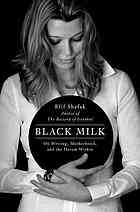
Black Milk
On Writing, Motherhood, and the Harem Within
کتاب های مرتبط
- اطلاعات
- نقد و بررسی
- دیدگاه کاربران
نقد و بررسی

March 14, 2011
Feeling conflicted about embarking on motherhood, Turkish novelist Shafak (The Forty Rules of Love) chronicles the cruel, crazy trajectory that took her from feminist single novelist to married nursing mother of two. An accomplished writer by her mid-30s, Shafak faced the eternal dilemma of most enlightened women: can she pursue her cherished work, be true to herself, and also be a selfless caregiver to children? An interview with a legendary Turkish novelist, Adalet Agaoglu, challenged Shafak to face her irresolution, resulting in a virtual civil war amid the discordant voices in her own conscienceâthe pint-sized Thumbelinas, she calls them, her own "mini harem"âwhich each try to dictate literally what she ought to do: e.g., Little Miss Practical organizes the hiring of her nanny, secretary, and assistant; Dame Dervish attends to her spiritual self; Miss Ambitious Chekhovian tells her to forget about babies, write better novels, and develop her skill; while Miss Highbrowed Cynic warns her that, having children or not, she will always regret the path she didn't take. Shafak gets the modern woman's despair, and especially enlightening are her renderings of the lives of (mostly English-language) women writers she admires: Virginia Woolf, Sylvia Plath, George Eliot, Zelda Fitzgerald. Shafak's stint as a resident at Mount Holyoke College and elsewhere has transformed her into a truly Western feminist voice within a region of engrained patriarchy: she is clear-eyed, savvy, unrepentant.

March 1, 2011
Acclaimed Turkish novelist Shafak (The Forty Rules of Love: A Novel of Rumi, 2010, etc.) examines the conflict she feels between her many identities.
Until the age of 35, writes the author, she defined herself as a writer, cosmopolitan, lover of Sufism, pacifist, vegetarian and woman "in more or less that order...and first and foremost...a teller of tales"—all while hearing a cacophony of competing internal voices. When she learned unexpectedly that she was pregnant, she was simultaneously thrilled and panicked. The "black milk" of the title refers to the conflict she felt between her roles as a writer and mother—her fears that she could not meet the demands of both simultaneously—and nearly year-long bout of postpartum depression she suffered. Her situation was made more stressful by the fact that during her pregnancy, she was charged with public denigration of Turkishness because of her reference to the Turkish-Armenian conflict in her novel The Bastard of Istanbul (2007). She also faced the demanding realities of motherhood while her husband was away, serving a mandatory tour in the military. Shafak has lived much of her life overseas, first with her mother and then as a visiting professor teaching at several U.S. universities. She compares her life to that of her traditional grandmother, whose marriage was arranged, and her mother, an emancipated woman who married for love, divorced and raised her daughter alone. While the author's standpoint is that of a modern Turkish woman, she muses about the lives and work of female writers from diverse backgrounds—George Elliot, Louisa May Alcott, Sylvia Plath, Zelda Fitzgerald, Simone de Beauvoir and Betty Friedan—who faced conflicts similar to her own.
A thoughtful, welcome addition to the works of women the author admires.
(COPYRIGHT (2011) KIRKUS REVIEWS/NIELSEN BUSINESS MEDIA, INC. ALL RIGHTS RESERVED.)

Starred review from May 1, 2011
In an intimate, affecting memoir, best-selling Turkish writer Shafak (The Forty Rules of Love, 2010) looks within to find answers to the question of how a woman may balance motherhood and a career. Light years from the standard perspective of supermom versus the world, Shafak relishes her independence and refuses to ignore fears about the impact of marriage and children on her most central self, that of a writer. She faces each warring part of her nature (delightfully caricatured as an internal harem of conflicting voices) and mines the lives of other female writers for insight. The great voices she discusses are impressive, including Virginia Woolf, Doris Lessing, George Sand, Louisa May Alcott, Zelda Fitzgerald, Sylvia Plath, and Ayn Rand. The list goes on and on, and no mention is casual. Shafak has reasons to discuss every life she mentions, including her own, and with an elegant yet steely force of will, she convinces readers to look for answers along with her. Her passion for literature is contagious, and her struggle with postpartum depression and writers block reinforces how carefully all of us must tread. Beautifully rendered, Shafaks Black Milk is an epic poem to women everywhere.(Reprinted with permission of Booklist, copyright 2011, American Library Association.)

























دیدگاه کاربران